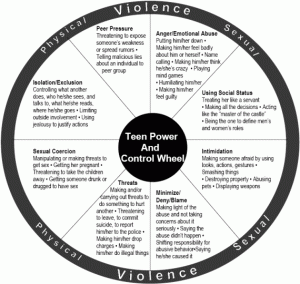Teen Dating Violence
1 in 3 adolescents in the United States is a victim of emotional, physical and/or sexual abuse from a dating partner. And yet, only about 33% of victims will ever reach out for help.
What is Teen Dating Violence (TDV)?
Dating violence is a pattern of physical, emotional, sexual or mental abuse that occurs in a romantic relationship among teens. The behaviors collectively make the victim question their self worth, sanity and further entrench them into the unhealthy relationship.
Signs of Teen Dating Violence
Teens who experience dating violence may exhibit the following signs:
- Sudden withdrawal from family or friends
- Unexplained injuries, such as bruises or cuts
- Frequent absences from school or social events
- Low self-esteem or signs of anxiety or depression
- Rapid changes in physical appearance
- Eating disorders
- New disciplinary issues (acting out or bullying others)
- Sudden drop in grades
- Lack of interest in extracurricular activities
- Fear or anxiety around a partner
- Becoming overly dependent or submissive to a partner
Helping a Friend or Loved One
LISTEN
Create a safe, non-judgmental space where the teen feels comfortable sharing their experiences. Let them speak openly without interrupting or blaming them for the situation. Validate their feelings and let them know they are not alone.
PLAN
Help them understand the importance of setting boundaries with their partner and developing a safety plan. This might include knowing who to call when they need help, knowing where to go in an emergency & how to safely exit the relationship if they choose to.
PROVIDE
Gently offer resources like domestic violence hotlines, school counselors, school programs like Safe to Say (anonymous reporting system that’s been required in every PA school since Jan 2019), or local support services. Help them understand that there are options for safety and support, whether through legal avenues, therapy, or support groups.
SUPPORT
Respect their decisions and let them know they have control over the next steps. Offer continued support, no matter what they decide, and reassure them that they are worthy of a healthy, respectful relationship.
Empowering Healthy Futures
Teen dating violence is a serious issue, but remember that you are not defined by the violence you experience. Whether you are directly affected or know someone who is, every teen deserves to be safe, respected, and empowered to make their own choices. Recognizing the signs and seeking support are courageous steps toward reclaiming control over your life and relationships.
At VIP, we are committed to providing resources and a safe space where you can find guidance, understanding, and help. If you or someone you know is struggling with dating violence, reach out to a trusted adult, counselor, or our support services. You deserve a future filled with healthy relationships and self-respect. Together, we can build a community where every teen feels valued and safe.
